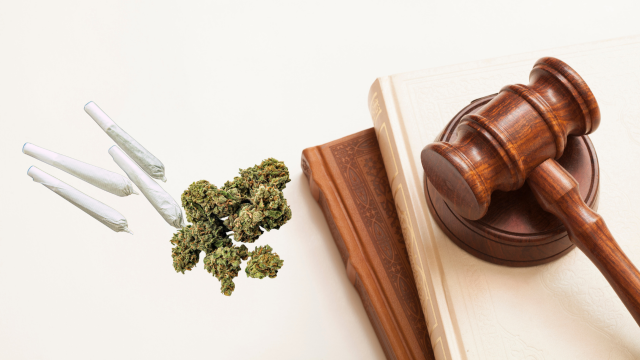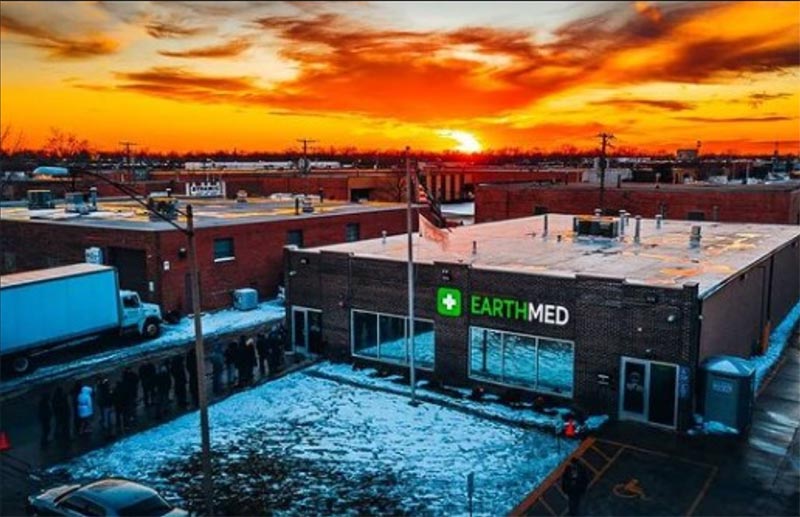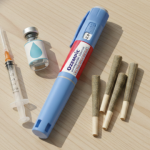Are you at least 21 years of age or hold a valid medical marijuana card?
Daily Specials
{{ special.title }}
{{ special.description }}
*{{ note }}EARTHMED BLOG

Cannabis History and Marijuana Legalization: From Prohibition to Progress

Cannabis has been a companion to humanity for millennia, historically revered for its medicinal, spiritual, and industrial uses. Ancient civilizations utilized marijuana and hemp for everything from easing pain to making ropes. But in the early 20th century, the United States turned its back on the plant, kicking off a crusade that would keep cannabis in the legal shadows for decades.
The Birth of Cannabis Prohibition
The 1930s marked the beginning of America's long and complicated relationship with cannabis prohibition. If you're tracing the weed prohibition timeline, it begins with Harry J. Anslinger, the first commissioner of the Federal Bureau of Narcotics, who was a key architect of the anti-cannabis narrative. His campaign demonized the plant as a danger to society, feeding off xenophobic and racist fears. His anti-cannabis messaging was echoed in sensationalist media coverage of the time, including by William Randolph Hearst’s newspapers, which frequently published negative stories about marijuana. Their efforts culminated in the Marihuana Tax Act of 1937, essentially banning cannabis at the federal level and laying the groundwork for decades of prohibition.
Schedule I and The War on Drugs
By 1970, the Controlled Substances Act officially classified cannabis as a Schedule I drug, grouped with heroin and LSD, considered to have no medical use and a high potential for abuse. This legal status blocked research and added fuel to the war on drugs. The 1980s took things even further.
Under President Reagan, the War on Drugs implemented mandatory minimums that led to a massive uptick in incarcerations, especially within Black and Latino communities. Despite similar usage rates across races, Black Americans were nearly four times more likely to be arrested for marijuana possession than their caucasian counterparts.
The Green Shoots of Legalization
But by the 1990s, things began to shift. California passed Proposition 215 in 1996, making it the first state to legalize medical marijuana. This paved the way for other states to follow suit, building a patchwork of cannabis laws across the country.
By 2012, Colorado and Washington had both legalized recreational cannabis. Illinois made waves in 2019 by becoming the first state to legalize adult-use cannabis via legislative action—not just a ballot initiative—and its law included measures to expunge past convictions.
Global Winds of Change
The cannabis legalization movement hasn't only been shaped by domestic activism—global policy has also played a role. The 1961 Single Convention on Narcotic Drugs, primarily pushed by the United States' influence, categorized cannabis as a controlled substance. But in recent years, international attitudes have shifted.
Canada and Uruguay legalized recreational cannabis, and countries like Germany and Thailand are moving toward reform. As these global shifts occur, the U.S. is being compelled to reassess its stance and adapt to the changing times.
Rescheduling vs. Descheduling: A Crucial Debate
Right now, cannabis is a Schedule I drug. The Biden administration moved to reschedule it to Schedule III, but what does that actually mean, and is it enough?
Here’s a quick breakdown:
- Rescheduling means moving cannabis to a lower category under the Controlled Substances Act. This would acknowledge its medical use and facilitate further research. Significant for the industry, rescheduling would alleviate the burden of IRS Code 280E, which prevents cannabis businesses from deducting ordinary and necessary business expenses.
- Descheduling, however, would remove cannabis from the CSA entirely, treating it more like alcohol or tobacco. This would open the doors for interstate commerce, easier banking access, and comprehensive criminal justice reform.
- Rescheduling, in my opinion, is a half-step—it offers some benefits but keeps federal control intact.
- Descheduling is the full leap that legalization advocates are really pushing for. It could pave the way for restorative justice, greater equity, and a unified legal framework across all 50 states.
Money Talks and Medicine Listens
Economically, legalization is proving to be a gold mine. States with legalized cannabis collect hundreds of millions of dollars in tax revenue annually, funding schools, infrastructure, and community programs. Medically, cannabis has shown promise for treating chronic pain, epilepsy, PTSD, and beyond—yet it remains frustratingly demonized and out of reach for many due to federal restrictions.
Justice on the Line
There’s also the social justice angle: many advocates argue that any real path forward with marijuana legalization must include expungement of past cannabis convictions and reinvestment in the communities hardest hit by prohibition. Descheduling, not just rescheduling, could support efforts to address harms from prohibition by enabling broader criminal justice reforms and economic opportunities, depending on how policies are implemented.
The Future is Flowering
While the fight is far from over, it’s clear that the tide has turned. Cannabis is no longer the boogeyman of Reefer Madness lore. Cannabis is legally recognized as medicine in many states, represents a growing commercial industry, and has been framed by advocacy groups as a civil rights issue due to disparities in past enforcement—and it’s high time the laws caught up with the culture.
How do you feel about the marijuana legalization path that the United States is currently on? Hit me up on social media, and let’s spark up a conversation about it!
{{ locations[0].name }}
{{ locations[0].address }}{{ locations[0].city }}, {{ locations[0].state }} {{ locations[0].zip }}
{{ locations[0].phone }}
Hours
Sun: {{ locations[0].hours_recreational.Sunday }}Mon: {{ locations[0].hours_recreational.Monday }}
Tue: {{ locations[0].hours_recreational.Tuesday }}
Wed: {{ locations[0].hours_recreational.Wednesday }}
Thu: {{ locations[0].hours_recreational.Thursday }}
Fri: {{ locations[0].hours_recreational.Friday }}
Sat: {{ locations[0].hours_recreational.Saturday }}
{{ locations[1].name }}
{{ locations[1].address }}{{ locations[1].city }}, {{ locations[1].state }} {{ locations[1].zip }}
{{ locations[1].phone }}
Hours
Sun: {{ locations[1].hours_recreational.Sunday }}Mon: {{ locations[1].hours_recreational.Monday }}
Tue: {{ locations[1].hours_recreational.Tuesday }}
Wed: {{ locations[1].hours_recreational.Wednesday }}
Thu: {{ locations[1].hours_recreational.Thursday }}
Fri: {{ locations[1].hours_recreational.Friday }}
Sat: {{ locations[1].hours_recreational.Saturday }}






